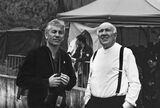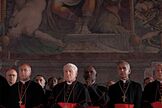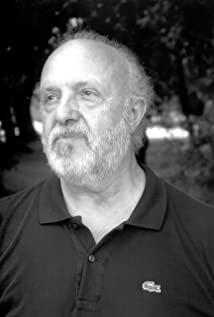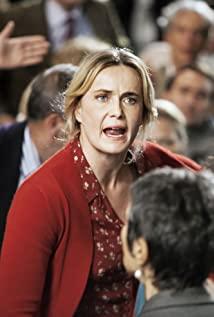If "Son's Room" uses listening as a methodology for psychotherapy, "The Birth of the Pope" is based on watching. Nanni Moretti woven a huge guise about where one billion people in this world should go, but after all, it only penetrates the inner world of a confused believer.
The film opened the prelude to viewing with several overlooking shots of St. Peter's Square and close-up shots of the bishops. The open and mysterious internal structure of the Holy See makes the camera's framing more free. The beating point of view, casual editing, with the uniform dress of the bishops and vivid micro-expressions, the whole internal election scene is also full of playful play. In front of the screen, we watched the big show before the crowds in the square. The director who is familiar with psychological mobilization once again played with the audience's hearts by "playing" divinity, thus entering a multi-nested viewing mode: God watching the crowd , The audience watch God, the director watch the audience.
Until the pope’s candidate was born, a new level of observation also emerged, that is, the bishop’s observation of the pope. In the first dialogue between the psychiatrist and the pope, this relationship was very comically displayed. In the head-up camera, they are sitting face to face in the middle of the frame. The distant view is the bishop watching in a semicircle. The pope sits in full face, like a lion being watched in a zoo.
But who should the pope watch? This became the question that the film tried to answer later. The pope told a female psychologist who did not know his identity that he was an actor, which was his subconscious yearning. Indeed, after he fled, the whole of Rome became his stage. He was like a restless child, as if he came to the world to breathe freely for the first time, and was suppressed by the crowd. Wandering in shopping malls, coffee shops, buses, hotels, he plays another identity, watching the busy people in the city, but the incompatibility that is difficult to conceal prevents him from truly losing his divinity. It seems that only the temple is his home of peace and happiness. .
A beautiful transition reveals the essence of viewing. The guard was arranged to sneak into the Pope's bedroom and use the shaking curtains to prove the presence of God. He enjoyed the Pope's breakfast, played with the Pope's gown, and played melodious music in the room. The singing came into the lounge, and the bishops danced to the beat as if they had received the will of God. The singing kept on, and the camera cut to the bishop walking in the city. He stopped by the intoxicated street performer and listened to her singing the same song. At this moment, the divine nature is gone, surrounded by the joy of mortals.
The subsequent volleyball game organized by the psychiatrist and the bishops once again strengthened the dislocation of the subject and the object. Doctors tried to interpret the Bible and teach science, but the bishops were disappointed, and a movement finally made them shake off. Mortals watched the game and cheered. The guards (fake pope) in the bedroom were shaking the curtains with excitement. The bishops found God's gaze and played more vigorously. Until they received news that the Pope had fled, the game was immediately suspended.
At the end of the film, the pope sneaked into the theater and became a real audience. He was so familiar with all the lines, as if traveling back to his undivided past. The bishops broke into the theater and once again awakened the gods. All the audience stood up and applauded to pay their attention, and the relationship between the subject and the object of watching returned to the original point again.
Of course, the pope will never go back. Facing the shoulder-to-shoulder crowd, he let go of his priesthood. The god standing on a high place completed his psychotherapy and finally woke up, but the people in the audience were once again confused. Who should they watch at this moment?
Is it ironic? Or revelation? The light of mortals makes gods introspect, but the introspection of gods makes mortals depressed-an unsolvable cycle.
View more about We Have a Pope reviews











